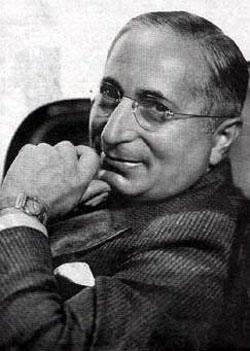Louis B Mayer (Lazar Meir)

Louis B Mayer
Motion Picture Executive. As Vice President in charge of production at Metro-Goldwyn-Mayer from its inception until 1951, he was the mightiest of Hollywood moguls. Although not creative himself, he was an administrative genius whose best efforts epitomized all the virtues of the major studio system. Mayer’s MGM was the ultimate “dream factory”, a manufacturer of innumerable classic films that promoted a wholesome, rose-tinted view of America for global consumption. A 1998 Time magazine poll rated him among the 100 Most Influential People of the 20th Century. He was born Lazar Meir in Deymer, near Kiev in the Ukraine, though he variously claimed his birthplace was Minsk, Omsk, and Poland. His family left the country in the early 1890s and settled in St. John, New Brunswick, Canada, where his father worked as a rag picker and junk dealer. Young Louis helped in the family business while attending high school and helped turn it into a profitable scrap metal operation. By age 19 he had his own junk dealership in Boston. In 1907 Mayer bought a decrepit nickelodeon in Haverhill, Massachusetts, and turned this modest sideline into New England’s largest theatre chain. He made a fortune from the area’s distribution rights to D.W. Griffith’s “The Birth of a Nation” (1915) and invested it in such Hollywood enterprises as Metro Pictures. In 1918 he formed Louis B. Mayer Productions, releasing his output through Metro. The films he produced as an independent were romantic melodramas which bore hallmarks of the later MGM style, notably their sentimental plots and glossy production values. Beginning with one star, Anita Stewart, he assembled a talent roster that came to include actresses Norma Talmadge and Renee Adoree, director Fred Niblo and, most important of all, Universal’s former production chief, the brilliant Irving Thalberg. In 1924, exhibitor Marcus Loew, owner of Metro Pictures, bought controlling interests in the Goldwyn and Mayer companies and merged them into the vast Metro-Goldwyn-Mayer, with Mayer in charge of West Coast operations and Thalberg as production head. Under Mayer’s leadership MGM became the most opulent of Hollywood studios, with “More stars than there are in heaven” and the finest craftsman and technicians money could buy. Seemingly inexhaustable in his work, volatile and vindictive, he ruled his domain as a paternalistic despot, using bully tactics, charm, and teary-eyed appeals to sentiment to get his way. (Actor Robert Taylor, asking for a salary increase, emerged from Mayer’s office mumbling, “I didn’t get the raise, but I gained a father”). His ruthlessness made him many enemies but even his detractors acknowledged his organizational skills and knack for hiring and developing talent. Mayer’s greatest adversary, oddly enough, was his own boss, Nicholas Schenck, President (since 1927) of MGM’s parent company, Loew’s, Inc. Their enmity dated from 1929 when Schenck secretly negotiated to sell Loew’s to rival producer William Fox; Mayer, who stood to lose his job, used his friends in the Hoover Administration to help kill the deal under anti-trust laws. The two men never forgave each other. Schenck depended on Mayer to run the production end but was wary of his popularity with the company’s shareholders, which he viewed as a threat to his own power. The death of Thalberg (a Schenck favorite) in 1936 only strengthened Mayer’s hold on the studio, and as long as MGM operated in the black – which it did for many years, even during the Depression – his position was unassailable. That position began to slip in the 1940s. Overconfident in his success, Mayer began spending less time at the studio to devote himself to his new passion, buying and breeding racehorses. After World War II he resisted the rise of television and changing public tastes and allowed MGM’s product to become thoroughly bland in its rosy escapism. In 1948, with company profits plummeting, Schenck ordered Mayer to find a replacement for the long-dead Thalberg as production chief. He hired RKO’s Dore Schary, who a decade before had worked for the studio as a screenwriter. The choice proved his undoing. Schary was opposed to Mayer’s production policies and clashed with the aging mogul over putting social relevance into MGM pictures. In 1951 Mayer gave Schenck a rash ultimatum: choose between him and Schary. Schenck had waited two decades for this opportunity. He ordered Mayer to resign. As a parting gift he was awarded an honorary Oscar for “distinguished service to the motion picture industry”. His prediction that he would be made head of another studio came to nothing, as did his attempts to buy RKO and Republic Pictures. He was named President of the Cinerama Company but was far more involved in stirring up trouble among Loew’s shareholders in a futile attempt to get MGM to take him back. He died of leukemia at 72, an unhappy multimillionaire. Mayer was instrumental in founding the Academy of Motion Picture Arts and Sciences in 1927, and the library of the American Film Institute was named for him. His daughter, Irene Mayer Selznick, married David O. Selznick and won fame as a Broadway producer. (bio by: Bobb Edwards) Family links: Parents: Jacob Mayer (1854 – 1930) Sarah Meltzer Mayer (1851 – 1913) Spouses: Margaret Shenberg Mayer (1883 – 1955)* Lorena Danker Mayer Jones Nidorf (1907 – 1985)* Children: Edith Mayer Goetz (1905 – 1988)* Irene Mayer Selznick (1907 – 1990)* Siblings: Louis B. Mayer (1885 – 1957) Rudolph W. Mayer (1889 – 1951)* Jerry Gershon Mayer (1891 – 1947)* *Calculated relationshipCause of death: Leukemia
Born
- July, 12, 1884
- Minsk, Russia
Died
- October, 29, 1957
- Los Angeles, California
Cause of Death
- Leukemia
Cemetery
- Home of Peace Memorial Park
- Los Angeles, California


